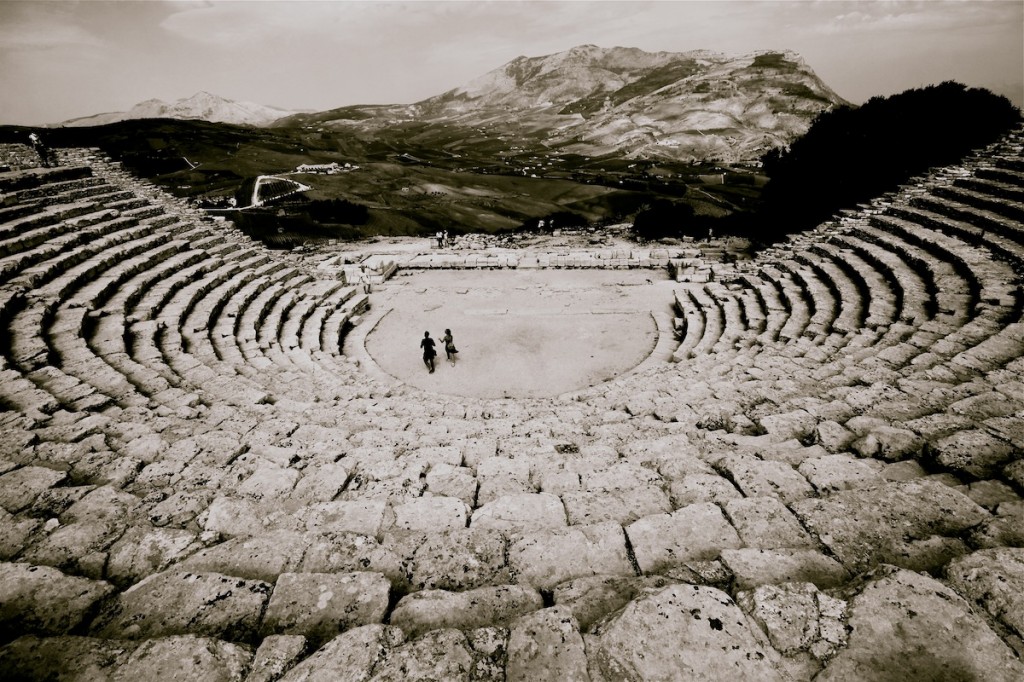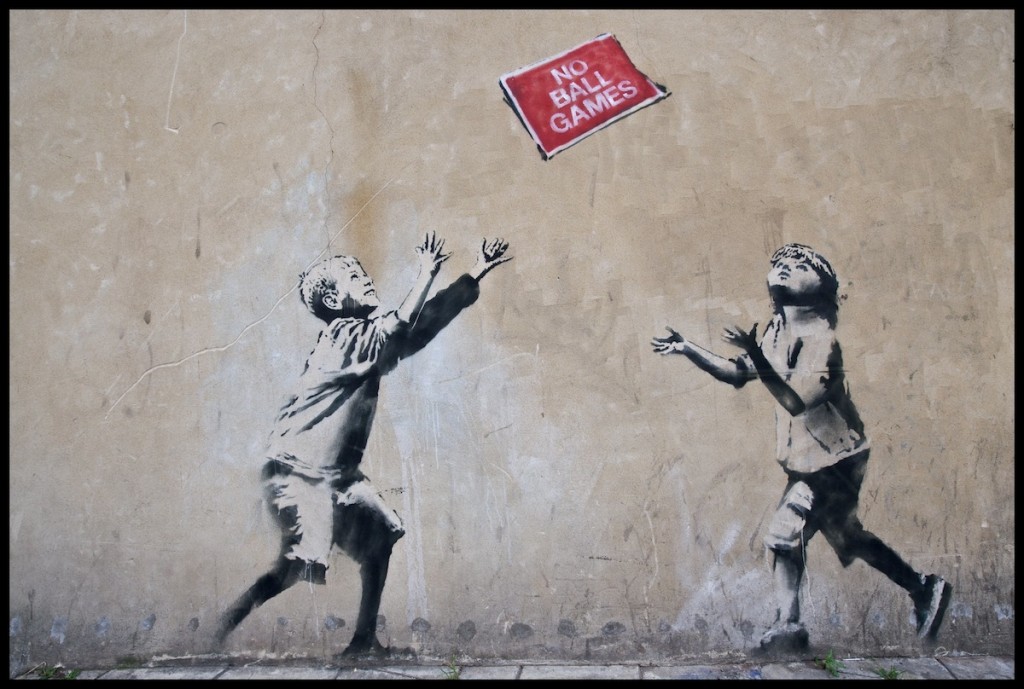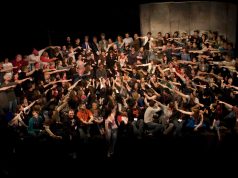“People who blindly subordinate themselves to collectives already turn themselves into something like material, annihilate themselves as self-determined beings. This meshes with the willingness to treat others like amorphous mass … A democracy that does not merely function, but holds itself to the standard of its actual definition, requires critical, reflective, self-determined people. One can only imagine actualized democracy as a society of self-determined people … The realization of self-determination lies therein that those few people, who are disposed to it, work with vehemence so that education is an education of opposition and resistance.” – Theodor W. Adorno
I was apprehensive about writing a follow-up article on “How Canadian Theatre is Killing Itself.” Any writing on “How Canadian Theatre Can Revive Itself” seems to be at risk of becoming dogmatic—of turning into a list of concrete, prescriptive solutions. But the solution to “reviving Canadian theatre” cannot and must not be to adopt the advice and aesthetics of a single person; rather, the solutions need to be defined by, and come from within, Canadian theatre artists themselves. For this search for solutions comprises an artistic act: if we believe that theatre is indeed a “rehearsal of the societal,” and artists are the “scientists of society” (Dirk Baecker*), then the creative struggle to define oneself (and one’s art form) as part of an environment, a system, a collective is a core artistic act of the theatre. And the core artistic act of the theatre is what we have to rediscover. As such, the point of this article is to problematize our current situation, and to ask questions that may provoke thought and inspiration in your own search for solutions.
I maintain throughout this post the central premise of “How Canadian Theatre is Killing Itself:” that the quintessential, defining characteristic of theatre—its identity as a live, collective experience, consisting of the mutual exchange and communion between artist and spectator—has been hollowed out by a) the capitalist structures at the core of our theatres and b) the simultaneous ascension of literal, movie-type storytelling, which makes theatre increasingly consumable, but prevents the participatory independence of the spectator. The loss of this live, collective experience also implies the forfeiture of theatre’s inherent radicalism: the quintessentially democratic process in which performers and spectators exist as intellectually, spiritually, and emotionally autonomous—“self-determined”—entities that commune in the collective act of constructing the story together.
What is the point of theatre?
In order to begin thinking about how to “revive” Canadian theatre, we must ask why we do it. In a world where theatre exists in the same capitalistic marketplace, and is a similar type of business venture as toy stores or restaurants, what is the theatre’s purpose? What has the theatre become in a world where anybody can choose theatre as their career and selling product? Is theatre still art, if it can be packaged and sold like flowers or deli meats? What is the point of theatre today?
In March 1998, German actor Josef Bierbichler received one of Germany’s most prestigious prizes for acting, the Gertrud-Eysoldt-Ring. But instead of keeping it (and the 20,000 Deutschmark that came with it), he passed it on to Christoph Schlingensief, a film and theatre director, who, in Bierbichler’s estimation, “still has the strength to see … and reveals a scandalous societal consensus, carried and tolerated by democrats, for which he is in turn considered scandalous.”** Bierbichler further elaborates,
“The self-censorship of most theatre makers under the increasing pressure on theatrical budgets has apparently developed to such a high degree that their keen intellects, which would be necessary to penetrate the thickening panzer of society to produce an outcry, have begun to wither away. But without the ability to elicit cries of anger and pain from society time and time again … theatre can give up and shut down. Agonized paralysis can be found in all living rooms in front of the TV. If this type of half-dead dozing is also going to fill the theatre auditorium, we should bid our farewell. If indignation and anger only exist within the status quo, instead of breaking it, to serve as the basis of controversial arguments, then we know that even the last refuge for everyday public argument and for the conscious refusal of consensus has been sucked dry by the Konsumkrake (consumer-capitalist kraken). If we, too, begin to bend ourselves out of shape to be loved and tolerated … then democracy really has no function anymore.”
Bierbichler defines the theatre’s mandate not only as quintessentially democratic, but also as existing in opposition to mass media, implying that the theatre’s significance grows as the world becomes increasingly media-saturated and thus less democratic. This means that, in conditions such as ours today, theatre is more important than ever before. The crux is, however, that if the theatre fails to fulfill its mandate of counteracting the “half-dead dozing” of mass media, it does not just immediately lose its purpose, but is actually instantaneously at risk of becoming part and parcel ofthe deadening of democracy. Making theatre today is thus about solving a difficult, important paradox: how can we appropriate tropes of entertainment without failing to counteract the structures and dogmas of mass media? How can we fulfill our democratic mandate and thus remain theatre? What are ways of piercing the “societal panzer,” of producing movement instead of paralysis?
Moreover, Bierbichler suggests that financial pressure leads to a form of artistic blindness, a kind of colonization of artistic consciousness that prevents artists from seeing and problematizing societal phenomena. How can we reconcile our responsibility to tackle large, high-stakes systemic questions with the financial pressures weighing on us? How can we avoid blindness, keep seeing, and perpetuate “self-determination?” How can we comprehend, manoeuver, and interrogate the system we are working within? Going even further, it seems that existential fears and our dependence on marketing have lead to a systemic obedience that is eradicating our ability for honest and rigorous criticism, including ruthless self-interrogation, which is crucial for the vivacity of any art form. This begs the following question:
Who are we accountable to?
As a quintessentially democratic medium, the theatre presupposes that we’re accountable to the groups we’re operating within and whose issues we’re addressing—our communities. Theatrical art is then a type of civic duty, a kind of democratic institution, where societal possibilities are explored and “rehearsed.” However, the commodification of theatre—its assimilation in the capitalist marketplace—has fractured and dispelled that accountability, because it necessarily implies a kind of “privatization.” Due to the theatre’s dependence on box office, private donations, and corporate sponsorship, it has grown apart from its community as a whole, having to foster instead special relationships with the upper classes. The theatre today requires, and is in fact at the mercy of, the money of those who benefit from, and thus likely support the status quo as mentioned above. This dependence complicates and pushes out our basic artsitic responsibility to problematize immediate systemic issues and societal realities, which in turn endangers the democratic essence of our art form, including our direct, honest relationship with our audiences. We need a new network of accountability and a revised artistic standard. How can we forge that? I believe that, at their core, artists want to be accountable to their community, to society; that is what they derive their purpose from. But how can that be married with the capitalist pressures weighing on them? How can we make this paradox work? How can our form respond to these circumstances?
“The heart of my artistry is bravery. I cultivate the revolutionary. Without bravery, art gets lost in convention, and the artist becomes trapped by society. The artist must also avoid property—all that makes her bourgeois. For art, she has to have passion, must be able to leave much good behind—not keep everything—not enter dependencies, only rely on her condition. And old acting saying goes: one has to have talent.” – Gertrud Eysoldt
As artists—especially as artists of the democratic medium—we are also accountable to those who come after us. I recently saw a show called The Last Witnesses (Die Letzten Zeugen), conceived by artists of the Burgtheater in Vienna. It featured a few of the last survivors of the Vienna pogroms in 1938, all of whom have endured crimes of unimaginable physical and psychological horror. These witnesses are in the very last phase of their life; one has already passed. Soon their legacy will be far out of reach. In a theatre full of people of all ages and from all types of backgrounds, who left the auditorium in utter silence, I have never felt the urgency of Heiner Müller’s statement more strongly:
“We must excavate the dead. Time and time again.”
We must keep alive for the next generation the radical art form that at once interrogates and models, and thus perpetuates, the only type of government that simultaneously requires and bears the potential for humanity: democracy. We have to “work with vehemence” to propagate “self-determination,” to provoke consciousness.
This is hitting close to home this week. An American think-tank addressed the issue of “The Rob Ford Phenomenon: What’s going on in Toronto?” on May 16. The Huffington Post quotes Canadian academic Anne Golden, who led the session: “People hold politicians in such low regard these days that they expect almost nothing from them. All they’re expected to do is not steal public money.” This is not the only indication of the severe political, democratic ennui and cynicism we are facing today. It’s time for the theatre to “excavate” itself, to practice its inherent civic, radical, democratic mandate. We all need it—maybe more than ever.
FOOTNOTES:
* In Wozu Theater? (Why Theatre?) by Dirk Baecker, Theater der Zeit, 2013
** At the time, Christoph Schlingensief was working on his project Tötet Helmut Kohl/Rettet Helmut Kohl/Chance 2000, in which he aimed to draw attention to the systematic marginalization of Germany’s staggering 5,000,000 unemployed citizens. The passages above are quoted and translated from the book Engagement und Skandal by Josef Bierbichler, Harald Martenstein, Christoph Schlingensief, with an essay by Diedrich Diederichsen.











